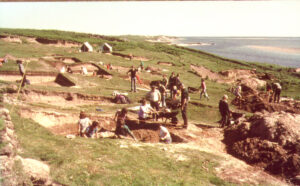
The excavation season is upon us and adverts for diggers have been landing thick and fast in my inbox together with posts about work starting at several significant sites. It made me think about my own days as a ‘digger’. In those days, you consulted the Council for British Archaeology Excavation Calendar in your local library and then sent off letters to prospective projects. It was a slow process. There were some perks, however, that seem to be lacking today; most notably money. Paying to work on a site was almost unknown, and only for the rich. Usually you were paid a weekly subsistence amount and, as I seem to remember, accommodation was arranged by the excavation project. This had the advantage that we all stayed together and a good dig social life soon built up. Friendships were made and held strong, I am still in touch with some of the people who I worked with in the early 70s and it always brings back memories to see a familiar name mentioned in the press or on social media, and learn what they are doing now.
The biggest advantage to this system was that it was possible to avoid serious gainful employment over the summer and gain valuable archaeological skills (and friends) while escaping the inevitable loss of savings that would arise from similar work today. If you chose your excavation sites carefully you could cover a wide range of periods, techniques and environments, all of which built up experience to stand one in good stead in the long run. And, in my day, the universities still had funds available to help those students wishing to excavate abroad: in that way, I got to work at Lazaret Cave in France and Hayonim Cave in Israel. It was often a steep learning curve, but one that was well worthwhile. My acquired skills were not restricted to archaeology: there were trips to hospital; catering for large numbers; the prevention of vermin; negotiation of foreign visas; even (surreally) the use of firearms. I can honestly say that my time as a youthful excavator helped to prepare me for a wide range of possible situations in later life.
I have no doubt that participation in an excavation today is just as rewarding in its own way. But, like all those who begin to see the younger generation filling roles they once occupied, I can’t help a feeling of nostalgia for times past. Ironically, perhaps the greatest lesson I learnt was that, having spent some time envying the responsibilities and role of the ‘site supervisors’, as soon as I found myself perched on the edge of the trench with a clipboard and a pencil I realised that I had made a horrible mistake. At that point, I wanted nothing more than to find myself back down in the trench at the centre of the action and with nary a care in the world.
You must be logged in to post a comment.